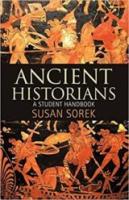
Bloomsbury (2012) p/b 243pp £28.99 (ISBN 9781441179913)
A general introduction giving a narrative overview of ancient history and exploring the complexity of using ancient historians as sources would have been a valuable volume: this, however, is not.
An explanation for the book’s approach or methodology would have been helpful, but the introduction is unclear in focus. It vaguely looks to raise questions of historiography, but instead sets out fairly contentious judgments as bald facts: ‘Xenophon…was largely free of rhetoric’ (2); Herodotus’ Histories is straighforwardly a moral tale of how ‘good triumphed over evil’ (5-6). The treatment of historiography is facile: simply a question of how accurate each historian might be. Josephus, for instance, merely wants to tell the truth, though can’t help but let personal bias creep into his account, just like Primo-Levi (sic) and the holocaust (7).
The structure of the book is opaque. Chapters vary from narrative summaries (‘Greece Third-Fifth Centuries BCE’ [why not fifth to third centuries?], ‘The Rise of Rome’, and so on), to explorations of particular historians, to a smattering of others—e.g. ‘Roman Historiography’ and ‘Men of Letters’. They are mostly, but not all, in chronological order, with no explanation as to why we sometimes jump backwards in time. Even within chapters timelines are disjointed: in ‘Other Roman and Early Christian works’, for instance, I cannot discern any principal of organisation. In ‘Greece Third-Fifth Centuries BCE’, description of Pericles’ building works follows Athens’ surrender to Sparta in 404, under the sub-heading ‘The Second Peloponnesian War’ (18-19). This chapter fails to mention Alexander the Great at all.
Facts and opinions presented as facts are wrong or misleading. Herodotus is shot through with a ‘theme of scepticism’ because the ‘gods tempt mortals to act beyond the limits of their greatness’ (25-6). While this might be a rather pessimistic view of divinity, it hardly qualifies as scepticism; the actual debates about Herodotus’ religious views go unmentioned. Xenophon leaves Greece in the Anabasis because he ‘was persuaded by a friend…to join the cause of Cyrus the younger’ in his rebellion (37); this is precisely what Xenophon denies in the Anabasis (3.1.9-10), claiming he was brought under false pretences. I expected S., having published a book on Josephus, to be sharper on the great Jewish historian, but even here disappointment abounds. Josephus is apparently the first writer ever to attempt to explain ‘God’s role in history’, a claim made seemingly in ignorance of Herodotus and the Old Testament. Josephus also apparently ‘decided to become a priest in the Pharisee sect’—a surprising turn of phrase to describe an author who spends the opening of his autobiography impressing the reader with the credentials of his hereditary priesthood. I could go on: examples abound throughout.
Lastly, the quality of writing is so poor that for this reason alone I would recommend the book be avoided. Basic grammatical errors are not uncommon; Herodotus believed that the ‘Persian wars… was the greatest of all wars’ (20); ‘the success of the Athenians… acted as a spur for much of their cultural achievements’; ‘seceded’ is used for ‘ceded’ (58); ‘edition’ for ‘addition’ (43). I will not give a list of misused and abused punctuation and the neglect of the possessive comma passim. Spelling is equally bad: the lack of proofreading is summed up by the fact that a whole chapter is given to ‘Qunitus Ennius’. More concerning (for a book written for the non-specialist), the few key phrases given in the original are often wrong: e.g. Carthaginem esse delend est for delendam esse (73—without noting that this supposed quotation of Cato has no ancient authority); imperium mius (rather than ‘maius’) is apportioned to Augustus (116).
No-one should buy this book.
Stuart Thomson
